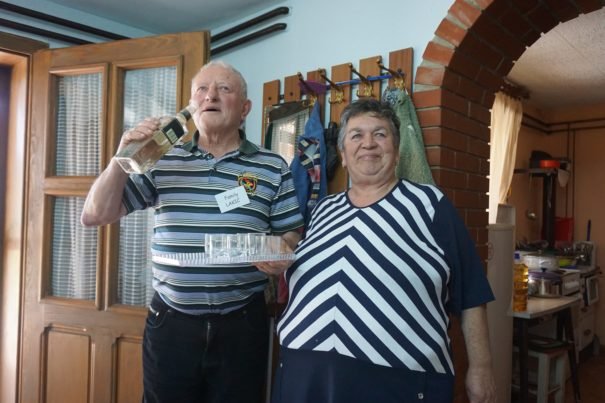
Brandy on a Farm Sounds Good and All But It’s No Sparkling Adriatic

Brandy on a Farm Sounds Good and All But It’s No Sparkling Adriatic
Rakia in Slavonia
Stjepan and his wife Milena greeted our group enthusiastically at the door of their farmhouse, just outside the city of Osijek in Croatia. He held a tray balancing several small glasses of clear rakia, the plum brandy traditionally offered to welcome guests.
The wide expanse of green farmland behind their house wasn’t exactly the Croatia I had in my mind. In fact, the sparkling Adriatic waters of Dubrovnik were over 300 miles away. Most travelers never make it to this region, known as Slavonia. Here, the Danube forms part of the natural boundary between Serbia and Croatia. Our cruise had docked nearby in the riverside city of Vukovar, and lunching with a local family was part of the day’s excursion.
Slavonia has a rich cultural heritage that combines the influences of its many neighbors. This part of Croatia wraps like an arm around Bosnia and Herzegovina, its fingers just brushing Serbia. The Hungarian border is less than an hour’s drive to the north.
Unfortunately, this particular region also suffered horribly during the Balkan Wars of the 1990s. Vukovar was shelled, besieged, and overrun. Osijek also experienced heavy losses. The area’s ethnic communities are still deeply divided.
Despite their divisions, Balkan countries share a love of rakia. It’s consumed with gusto as a shot, and the perfumed liquid slides down the throat like fire, searing the sinuses. It didn’t matter that it was barely noon: Stjepan was generous with refills as we sat at their long dining room table.
We were treated to more than just rakia that day. Next came a pitcher of local red wine, and a full lunch that included bright tomato soup, beet salad, and pork and beef meatballs redolent of garlic and black pepper. Homemade sour-cherry pastries were the grand finale. The pleasant afternoon, made all the more convivial by the rakia and wine, concluded with a tour of their farm, complete with hogs, chickens, and a meat-curing cellar filled with hanging salamis, hams, and pancetta.
We got to know Stjepan and Milena through an interpreter. Stjepan was curious to know about the lives of all his guests, but we were much more interested in learning about them. Milena shared some photos of their adult son and their grandson. Stjepan talked about how he played soccer professionally for three years and also worked as a cook.
“Then the war changed everything,” he said. He didn’t expand on that, and then it was time to leave.